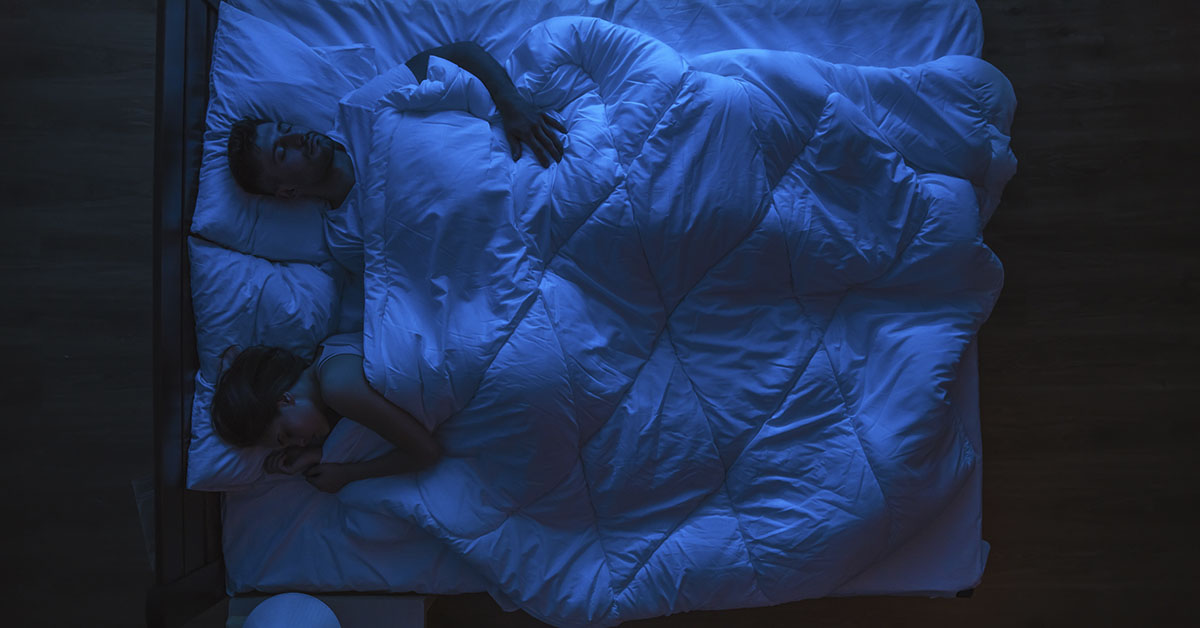Are you someone who needs complete darkness to sleep at night? This study shows that beyond personal preference, there’s actual scientific reasoning behind sleeping in the dark. Not only does it help you fall asleep faster, but sleeping with light affects your health in some surprising ways.
Why Sleeping In The Dark Affects Your Health
Most of us can probably agree that it is easier to fall asleep in the dark than when there’s a lot of light in the room. In fact, many people find it completely impossible to fall asleep in anything but complete darkness. A group of researchers decided to look into the science behind sleeping in the dark and its effects on human health. They found that not only does sleeping in the dark help you fall asleep faster, but sleeping with light affects your health negatively. (1)
Researchers from Northwestern University’s School of Medicine studied 20 participants and their sleep in various conditions in a laboratory. They had the participants come in two separate times, once for three nights and the second time for two nights. On each of these nights, there were different levels of light where the participants were sleeping. Each participant had their own room and had standardized sleep schedules and meals.
The Study Results
Throughout the day, the scientists measured the participants’ heart rates, insulin, and glucose levels. After sleeping in rooms with light, even dimly lit, their heart rates were all higher. This is a sign that their nervous systems are activated. This is not normal and can affect your health in various ways.
The researchers also found an association between sleeping in a lit room and increased insulin resistance. This occurred in the morning after the participants had slept in lit rooms. This meant that it was harder for their bodies to metabolize glucose, prompting an increased insulin production, which caused an increase in their blood sugar. For some, this can lead to the development of Diabetes.
One Small Study
The researchers were clear that this study is just one very small study. What they do say is that this study, and others like it, may lead to a new area of research that can look at the effects of sleep and more on the development of other health problems. There have been other studies done that have found similar results. One found that people who sleep in rooms with artificial light might be more likely to be obese. They couldn’t determine through that study the reason why, though. However, this new study shows that it may be related to elevated heart rate and glucose. (2)
What Kinds of Light Could Be Affecting You?
Room lights and lamps aren´t the only lights that could be affecting your sleep and your health. Street lamps, TV, and the blue light our electronic devices give off can affect us. Big or small, this light can cause changes in the quality of your sleep. Light of any amount can make it harder for your brain to enter deep sleep. This also includes light exposure before bed, which is why limiting screen time before sleep is a wise idea. This deep sleep phase is critically important to feel well-rested and energized the next day and your health. (3)
Without sufficient deep sleep, you are more susceptible to several health problems. These include depression, obesity, chronic illnesses such as type 2 diabetes, hypertension, and heart disease, as well as making you more likely to have accidents. That last one is particularly important if you drive often and also if you have to operate heavy machinery for work.
Read: Researchers find that brains with more vitamin D function better
What Happens To Our Bodies When We Sleep?
Sleep is incredibly important for our bodies and our health. If it weren’t, why else would evolution allow us to develop, requiring eight hours each night when we are unconscious and, therefore, vulnerable? Scientists are still discovering more of what goes on in our bodies when we sleep at night. So far, we know that sleep is important for brain and body repair, muscle recovery, fighting illnesses and chronic conditions, improving your mood, and helping children grow.
If you’ve grown accustomed to sleeping with light and find it hard to sleep without it, it doesn’t mean that your body is “used to it” and your health isn’t affected. Take steps to teach yourself to start sleeping in the dark. Slowly wean yourself off of lights and avoid other things that will also affect your capacity to sleep, such as caffeine, alcohol, or large meals close to bedtime. Do your best to get into a proper bedtime routine and a regular sleep schedule, aka going to bed and waking up at the same time each night and morning. All of this will help you to fall asleep and improve your sleep quality.
Keep Reading: The cancer symptom that strikes at night – and 13 other signs you need to know
Sources
- “Light exposure during sleep impairs cardiometabolic function.” PNAS. Ivy C. Mason, et al.
- “Artificial light during sleep linked to obesity.” NIH.
- “Is Sleeping with the Lights On Good or Bad for You?” Healthline. Kristeen Cherney.

